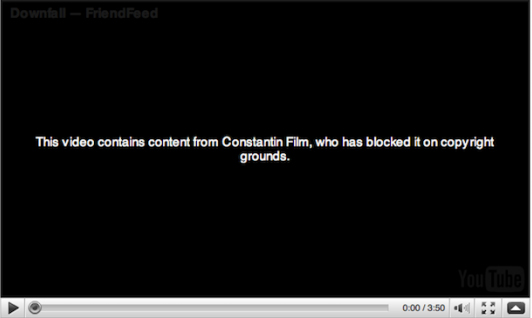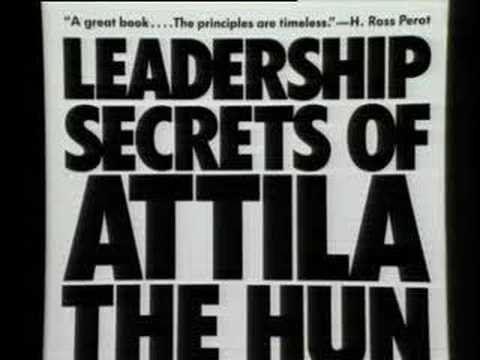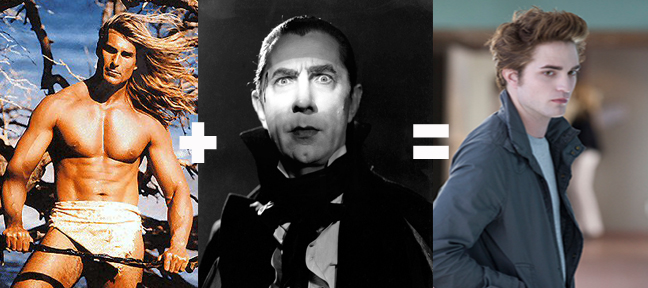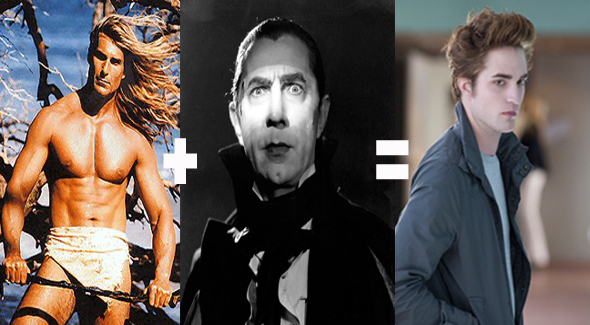
Since 2008, more than eight million people have watched online videos from the Hitler Finds Out About… meme, in which the subtitles from a clip from the 2005 German film Die Untergang (known in the English speaking world as Downfall) are replaced in order to make it appear that Hitler is very angry about Michael Jackson, video games, Hillary Clinton, Kobe or the fact that everyone forgot his birthday.
The meme was huge, one of the biggest of its time, with hundreds of variations and millions of views. Last week, Constantin Films, the company that owns the film started pulling the videos off of YouTube claiming that they violated the company’s copyright. Many of them are still up, but the most popular ones (including the one where Hitler gets kicked off of Xbox Live – >6 million views) were the first to go.
The deletion of this entire meme may seem inconsequential, but for a culture built on mashups, this copyright fight is a serious step in the wrong direction. It’s also one of the worst business decisions since, well, that guy at Goldman who didn’t realize that email can be subpoenaed as evidence.
If you haven’t seen one of these, watch Hitler discuss the meme himself or Google “Hitler parody” and choose your topic.

Hitler was upset when McCain nominated Palin.
When it came out, Downfall generated a lot of controversy for humanizing Hitler. Critics worried that by showing him as a man under extraordinary pressure who also had a kind word for his secretaries, the horrors he perpetrated would seem less evil. In an age when we know the intimate personal details of our leaders, I argue that we could all use a little reminder that just because a politician has traits with which we can sympathize doesn’t mean that he or she isn’t capable of atrocity.
When these parodies started generating huge interest, another wave of criticism worried that making Hitler a comedic figure similarly threatened to mitigate the world’s repugnance towards the Nazis. While I understand their argument, I can’t help but think about Attila the Hun.
Attila lived during the 5th century CE, during which time he led the Huns from the Baltic Sea to France, burning, raping and pillaging the whole time. He was so feared by the Romans that he earned the nickname “The Scourge of God” and was the boogeyman that Roman children feared for centuries after his death. 1500 years ago in Europe, Attila was the worst person in the world.
Today, we remember so little about him that US Presidential candidates will wholeheartedly endorse books that purport to impart the great secrets of Attila’s leadership. That’s how it goes. History shows us that moral outrage, however warranted, has an expiration date. A few hundred years from now, most people will remember that Hitler was a bad guy, but as has happened to Attila, Genghis Khan or Nero, the details will start to get fuzzy and Hitler will lose his menace. These videos were part of that inevitable trend.

Apparently, Attila would have come in a distant third to Clinton and H.W. Bush.
Unlike its production company, Downfall director Oliver Hirschbiegel likes the parodies. In a recent interview, he makes a different point about their effect on how Hitler is remembered:
“The point of the film was to kick these terrible people off the throne that made them demons, making them real and their actions into reality,” he says. “I think it’s only fair if now it’s taken as part of our history, and used for whatever purposes people like.”
But we digress. We’re not here to talk about the film, we’re here to talk about why pulling the Downfall parodies off of YouTube was a very bad idea.
In 2007, very few people in America knew about Downfall. It had been nominated for a Best Foreign Language Oscar, but that section is when most of America goes out for more chips. In theatrical release, the film earned only $5 million in the US (out of ~$90 million worldwide).
But then came the meme. In 2008, millions of people were suddenly made aware of the film. If a marketing firm had started it, it might have been the single most successful viral marketing campaign of all time.
According to www.the-numbers.com, retailers like Wal-Mart don’t publicly report DVD sales, so it’s tough to figure out what any given film makes after it goes to video. The only rubric I’ve been able to find is Amazon.com’s sales ranking system.
The other Foreign Language Oscar contenders in 2005 were As It Is In Heaven (The 4,666th most popular film on Amazon’s movies and TV category), The Chorus (#1,886), Yesterday (#19,092), and the winner, The Sea Inside (#25,568, even though it starred the now famous Javier Bardem). 2010’s winner, El Secreto de sus Ojos, is ranked #934.

Despite the hard work of five or six people, the "Javier Bardem hears about..." meme failed to take off.
Downfall, an also ran from five years ago, is ranked #475. Considering that Amazon has hundreds of thousands of DVDs for sale: 475 is pretty damn good for a German film that almost nobody saw in theaters.
Destroying a meme that has kept your five-year-old foreign language film raking in serious cash long past its predicted expiration date? Good work, Constantin Films.
This was a bad move for Constantin Films, but a worse move for our culture. While not an expert on copyright law, I believe in Fair Use and free speech. That’s why I’m a member of the Electronic Frontier Foundation and why I’ll let them give you all the details. For those who don’t want to click through, suffice it to say that these videos don’t actually violate Constantin’s copyright and, as parodies, should be protected by the legal doctrine of fair use. If you look at the four factors that determine fair use, the fact that the company’s making a fortune off of this meme should singlehandedly make the legality of these parodies obvious.
Fair use is important because our culture is a mashup, a conglomeration of ideas and themes that have come before, remixed by each generation to fit the world in which it lives. The ideas of the past are the fuel of the future and if copyright protection forces us to stop borrowing ideas from one another, our culture will soon run out of gas.
Or, as Cory Doctorow at BoingBoing put it: “Three or four billion years ago, by some process that we don’t understand, molecules began to copy themselves. We are the distant descendants of those early copyists – copying is in our genes. We have a word for things that don’t copy: ‘dead’.”
You want proof?
George Lucas grew up on Buck Rogers and loved Akira Kurosawa’s The Hidden Fortress. Now we have the original trilogy.
Twilight is a 21st Century romance novel retelling of Dracula, a 19th Century Romantic novel. Stoker’s Count was himself a hybrid of a sadistic Eastern European warlord and a bunch of old ghost stories.
J.K. Rowling = J.R.R. Tolkien + Judy Bloom

Abraham Lincoln: Vampire Hunter? Pride and Prejudice and Zombies? This is what we do. This is where our culture comes from. There are no original ideas and that’s ok – our minds are designed to learn from and build on the foundation of the past. It’s a phenomenon that’s accelerated incredibly in the last few decades, but it goes back pretty far.
Virgil took themes, characters and structure from the Iliad and the Odyssey, stirred in the legend of Romulus and Remus, sprinkled on Julius Ceasar’s claim to have descended from Venus and served up the Aeneid, which has been on every required reading list for the last two milennia.
Shakespeare stole from every source he could find and he’s been on those same lists for 400 years.
The US Constitution is a fine cocktail of Roman Republican structures and Enlightenment ideals garnished with a slice of the Magna Carta.

Anyone know what "Thou shalt not" would have been in the original Hebrew?
The King James Bible, the one most American churches use today, may be the greatest mashup of them all. The Torah, or Old Testament, was the collected writings of centuries of Jewish scholars and priests who combined stories from Babylon (the Flood) with local history and legends, Greek philosophy, health tips (bacon has always been bad for you) and their own moral prescriptions. A couple of centuries later, after the Torah went into the public domain, Christians added four stories about Jesus, the contents of Paul’s outbox and the disturbing predictions of St. John. Then, in 1601, King James has the whole thing subtitled in Shakespearean English. It’s now one of the most important books in Western Civilization.
Future generations will not, we must hope, base their faith, their government or their education on a four-minute video of Hitler yelling about his Xbox. Nonetheless, these videos were a unique moment of collaboration and community in which hundreds of creators and millions of fans took part. They were a fad, but one that told us a lot about who we were at that particular moment. The people behind the removal of these videos and the larger fight for stricter copyright laws fail to recognize the way that our culture has always worked.
They’re putting profit ahead of good entertainment and if they win, future generations won’t have much to Overthink.
PS: here’s the latest mashup to grab my attention. It turns out that Super Mario Brothers is even more fun if you’re playing as MegaMan, Link or Blue Pants.

http://youtomb.mit.edu/about really interesting site.
Great article! And that mashup is incredible!!
Good article. “The people behind the removal of these videos and the larger fight for stricter copyright laws fail to recognize the way that our culture has always worked.
They’re putting profit ahead of good entertainment and if they win, future generations won’t have much to Overthink.”
Call me paranoid, but to me there’s a connection going from “failing to recognize the way that our culture has always worked” (which they ain’t, they know and don’t care, these people know what they’re doing, they’re OK with it.)and “putting profit ahead” because “if they win, future generations won’t have much to (Over)think”.
That seems to me in the long term and on the larger scale to be so coincidentially convenient.
A regulated and minority controlled culture is the opposite of a spontaneous and creative culture which feeds on thinking to function: “the way that our culture has always worked”.
Does that mean that we’re standing on a fork in the road?, perhaps a key one?
Hey, that’s me Oversimplyfing it (Don’t sue me, won’t happen again )
Here’s a semi-related article from Wired about how fair use rules help the economy: http://www.wired.com/threatlevel/2010/04/fairuse-economy/
Thought you might be interested.
I liked the article!
Small “Well, ACTUALLY” for you: The German title for the film is “Der Untergang” not “die” (“der” being the masculine article, “die” being feminine).
I also liked these parodies. But for me as a German, it was always really difficult to watch them, because I hear Hitler talking about these losses in the war, and read subtitles about his XBox or whatever. Very demanding on one’s consciousness.